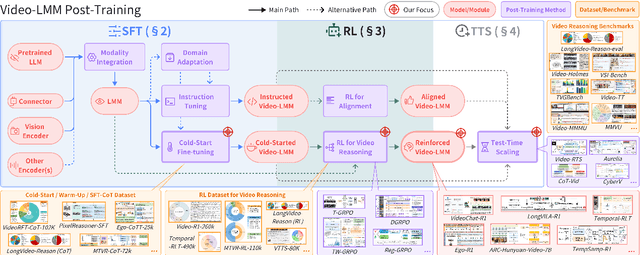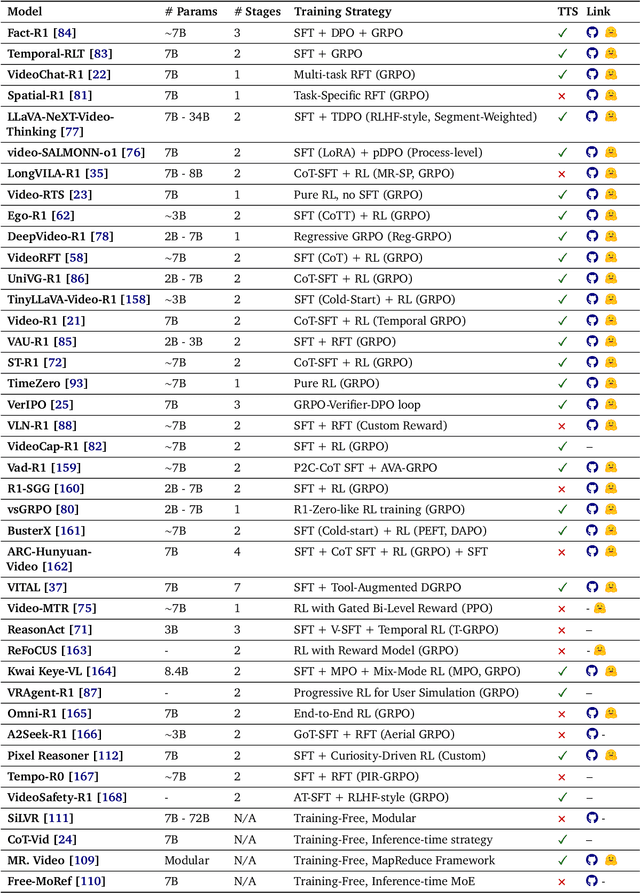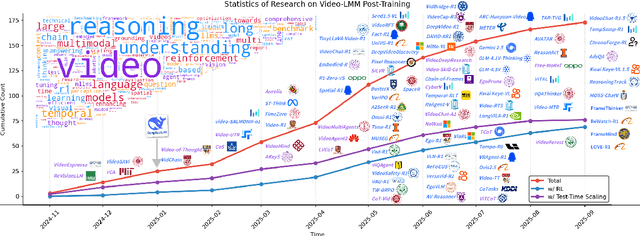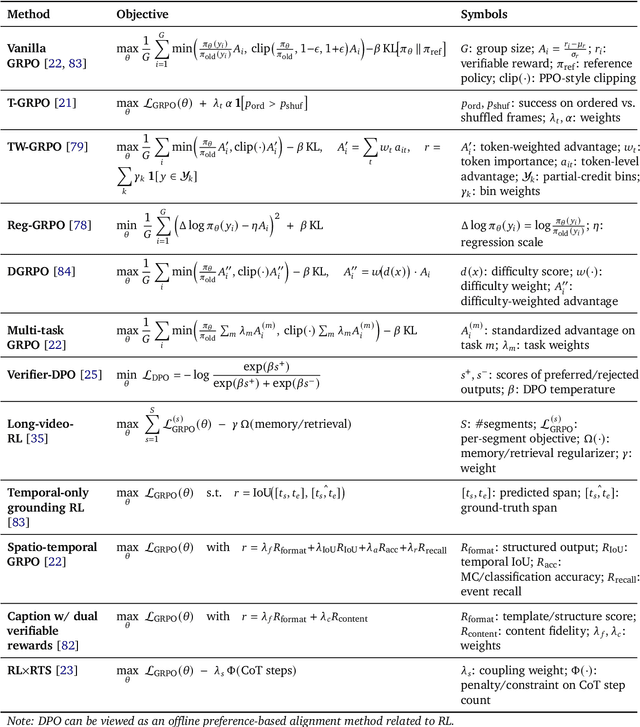Zhiyuan Wang
Towards Efficient and Robust Linguistic Emotion Diagnosis for Mental Health via Multi-Agent Instruction Refinement
Jan 20, 2026Abstract:Linguistic expressions of emotions such as depression, anxiety, and trauma-related states are pervasive in clinical notes, counseling dialogues, and online mental health communities, and accurate recognition of these emotions is essential for clinical triage, risk assessment, and timely intervention. Although large language models (LLMs) have demonstrated strong generalization ability in emotion analysis tasks, their diagnostic reliability in high-stakes, context-intensive medical settings remains highly sensitive to prompt design. Moreover, existing methods face two key challenges: emotional comorbidity, in which multiple intertwined emotional states complicate prediction, and inefficient exploration of clinically relevant cues. To address these challenges, we propose APOLO (Automated Prompt Optimization for Linguistic Emotion Diagnosis), a framework that systematically explores a broader and finer-grained prompt space to improve diagnostic efficiency and robustness. APOLO formulates instruction refinement as a Partially Observable Markov Decision Process and adopts a multi-agent collaboration mechanism involving Planner, Teacher, Critic, Student, and Target roles. Within this closed-loop framework, the Planner defines an optimization trajectory, while the Teacher-Critic-Student agents iteratively refine prompts to enhance reasoning stability and effectiveness, and the Target agent determines whether to continue optimization based on performance evaluation. Experimental results show that APOLO consistently improves diagnostic accuracy and robustness across domain-specific and stratified benchmarks, demonstrating a scalable and generalizable paradigm for trustworthy LLM applications in mental healthcare.
$A^3$-Bench: Benchmarking Memory-Driven Scientific Reasoning via Anchor and Attractor Activation
Jan 14, 2026Abstract:Scientific reasoning relies not only on logical inference but also on activating prior knowledge and experiential structures. Memory can efficiently reuse knowledge and enhance reasoning consistency and stability. However, existing benchmarks mainly evaluate final answers or step-by-step coherence, overlooking the \textit{memory-driven} mechanisms that underlie human reasoning, which involves activating anchors and attractors, then integrating them into multi-step inference. To address this gap, we propose $A^3$-Bench~ https://a3-bench.github.io, a benchmark designed to evaluate scientific reasoning through dual-scale memory-driven activation, grounded in Anchor and Attractor Activation. First, we annotate 2,198 science reasoning problems across domains using the SAPM process(subject, anchor & attractor, problem, and memory developing). Second, we introduce a dual-scale memory evaluation framework utilizing anchors and attractors, along with the AAUI(Anchor--Attractor Utilization Index) metric to measure memory activation rates. Finally, through experiments with various base models and paradigms, we validate $A^3$-Bench and analyze how memory activation impacts reasoning performance, providing insights into memory-driven scientific reasoning.
MAXS: Meta-Adaptive Exploration with LLM Agents
Jan 14, 2026Abstract:Large Language Model (LLM) Agents exhibit inherent reasoning abilities through the collaboration of multiple tools. However, during agent inference, existing methods often suffer from (i) locally myopic generation, due to the absence of lookahead, and (ii) trajectory instability, where minor early errors can escalate into divergent reasoning paths. These issues make it difficult to balance global effectiveness and computational efficiency. To address these two issues, we propose meta-adaptive exploration with LLM agents https://github.com/exoskeletonzj/MAXS, a meta-adaptive reasoning framework based on LLM Agents that flexibly integrates tool execution and reasoning planning. MAXS employs a lookahead strategy to extend reasoning paths a few steps ahead, estimating the advantage value of tool usage, and combines step consistency variance and inter-step trend slopes to jointly select stable, consistent, and high-value reasoning steps. Additionally, we introduce a trajectory convergence mechanism that controls computational cost by halting further rollouts once path consistency is achieved, enabling a balance between resource efficiency and global effectiveness in multi-tool reasoning. We conduct extensive empirical studies across three base models (MiMo-VL-7B, Qwen2.5-VL-7B, Qwen2.5-VL-32B) and five datasets, demonstrating that MAXS consistently outperforms existing methods in both performance and inference efficiency. Further analysis confirms the effectiveness of our lookahead strategy and tool usage.
Risk-Aware Financial Forecasting Enhanced by Machine Learning and Intuitionistic Fuzzy Multi-Criteria Decision-Making
Dec 11, 2025Abstract:In the face of increasing financial uncertainty and market complexity, this study presents a novel risk-aware financial forecasting framework that integrates advanced machine learning techniques with intuitionistic fuzzy multi-criteria decision-making (MCDM). Tailored to the BIST 100 index and validated through a case study of a major defense company in Türkiye, the framework fuses structured financial data, unstructured text data, and macroeconomic indicators to enhance predictive accuracy and robustness. It incorporates a hybrid suite of models, including extreme gradient boosting (XGBoost), long short-term memory (LSTM) network, graph neural network (GNN), to deliver probabilistic forecasts with quantified uncertainty. The empirical results demonstrate high forecasting accuracy, with a net profit mean absolute percentage error (MAPE) of 3.03% and narrow 95% confidence intervals for key financial indicators. The risk-aware analysis indicates a favorable risk-return profile, with a Sharpe ratio of 1.25 and a higher Sortino ratio of 1.80, suggesting relatively low downside volatility and robust performance under market fluctuations. Sensitivity analysis shows that the key financial indicator predictions are highly sensitive to variations of inflation, interest rates, sentiment, and exchange rates. Additionally, using an intuitionistic fuzzy MCDM approach, combining entropy weighting, evaluation based on distance from the average solution (EDAS), and the measurement of alternatives and ranking according to compromise solution (MARCOS) methods, the tabular data learning network (TabNet) outperforms the other models and is identified as the most suitable candidate for deployment. Overall, the findings of this work highlight the importance of integrating advanced machine learning, risk quantification, and fuzzy MCDM methodologies in financial forecasting, particularly in emerging markets.
Video-LMM Post-Training: A Deep Dive into Video Reasoning with Large Multimodal Models
Oct 06, 2025



Abstract:Video understanding represents the most challenging frontier in computer vision, requiring models to reason about complex spatiotemporal relationships, long-term dependencies, and multimodal evidence. The recent emergence of Video-Large Multimodal Models (Video-LMMs), which integrate visual encoders with powerful decoder-based language models, has demonstrated remarkable capabilities in video understanding tasks. However, the critical phase that transforms these models from basic perception systems into sophisticated reasoning engines, post-training, remains fragmented across the literature. This survey provides the first comprehensive examination of post-training methodologies for Video-LMMs, encompassing three fundamental pillars: supervised fine-tuning (SFT) with chain-of-thought, reinforcement learning (RL) from verifiable objectives, and test-time scaling (TTS) through enhanced inference computation. We present a structured taxonomy that clarifies the roles, interconnections, and video-specific adaptations of these techniques, addressing unique challenges such as temporal localization, spatiotemporal grounding, long video efficiency, and multimodal evidence integration. Through systematic analysis of representative methods, we synthesize key design principles, insights, and evaluation protocols while identifying critical open challenges in reward design, scalability, and cost-performance optimization. We further curate essential benchmarks, datasets, and metrics to facilitate rigorous assessment of post-training effectiveness. This survey aims to provide researchers and practitioners with a unified framework for advancing Video-LMM capabilities. Additional resources and updates are maintained at: https://github.com/yunlong10/Awesome-Video-LMM-Post-Training
Machine Learning-Assisted Surrogate Modeling with Multi-Objective Optimization and Decision-Making of a Steam Methane Reforming Reactor
Jul 10, 2025Abstract:This study presents an integrated modeling and optimization framework for a steam methane reforming (SMR) reactor, combining a mathematical model, artificial neural network (ANN)-based hybrid modeling, advanced multi-objective optimization (MOO) and multi-criteria decision-making (MCDM) techniques. A one-dimensional fixed-bed reactor model accounting for internal mass transfer resistance was employed to simulate reactor performance. To reduce the high computational cost of the mathematical model, a hybrid ANN surrogate was constructed, achieving a 93.8% reduction in average simulation time while maintaining high predictive accuracy. The hybrid model was then embedded into three MOO scenarios using the non-dominated sorting genetic algorithm II (NSGA-II) solver: 1) maximizing methane conversion and hydrogen output; 2) maximizing hydrogen output while minimizing carbon dioxide emissions; and 3) a combined three-objective case. The optimal trade-off solutions were further ranked and selected using two MCDM methods: technique for order of preference by similarity to ideal solution (TOPSIS) and simplified preference ranking on the basis of ideal-average distance (sPROBID). Optimal results include a methane conversion of 0.863 with 4.556 mol/s hydrogen output in the first case, and 0.988 methane conversion with 3.335 mol/s hydrogen and 0.781 mol/s carbon dioxide in the third. This comprehensive methodology offers a scalable and effective strategy for optimizing complex catalytic reactor systems with multiple, often conflicting, objectives.
ChordPrompt: Orchestrating Cross-Modal Prompt Synergy for Multi-Domain Incremental Learning in CLIP
Jun 24, 2025Abstract:Continual learning (CL) empowers pre-trained vision-language models to adapt effectively to novel or previously underrepresented data distributions without comprehensive retraining, enhancing their adaptability and efficiency. While vision-language models like CLIP show great promise, they struggle to maintain performance across domains in incremental learning scenarios. Existing prompt learning methods face two main limitations: 1) they primarily focus on class-incremental learning scenarios, lacking specific strategies for multi-domain task incremental learning; 2) most current approaches employ single-modal prompts, neglecting the potential benefits of cross-modal information exchange. To address these challenges, we propose the \ChordPrompt framework, which facilitates a harmonious interplay between visual and textual prompts. \ChordPrompt introduces cross-modal prompts to leverage interactions between visual and textual information. Our approach also employs domain-adaptive text prompts to select appropriate prompts for continual adaptation across multiple domains. Comprehensive experiments on multi-domain incremental learning benchmarks demonstrate that \ChordPrompt outperforms state-of-the-art methods in zero-shot generalization and downstream task performance.
SConU: Selective Conformal Uncertainty in Large Language Models
Apr 19, 2025Abstract:As large language models are increasingly utilized in real-world applications, guarantees of task-specific metrics are essential for their reliable deployment. Previous studies have introduced various criteria of conformal uncertainty grounded in split conformal prediction, which offer user-specified correctness coverage. However, existing frameworks often fail to identify uncertainty data outliers that violate the exchangeability assumption, leading to unbounded miscoverage rates and unactionable prediction sets. In this paper, we propose a novel approach termed Selective Conformal Uncertainty (SConU), which, for the first time, implements significance tests, by developing two conformal p-values that are instrumental in determining whether a given sample deviates from the uncertainty distribution of the calibration set at a specific manageable risk level. Our approach not only facilitates rigorous management of miscoverage rates across both single-domain and interdisciplinary contexts, but also enhances the efficiency of predictions. Furthermore, we comprehensively analyze the components of the conformal procedures, aiming to approximate conditional coverage, particularly in high-stakes question-answering tasks.
The Sword of Damocles in ViTs: Computational Redundancy Amplifies Adversarial Transferability
Apr 15, 2025Abstract:Vision Transformers (ViTs) have demonstrated impressive performance across a range of applications, including many safety-critical tasks. However, their unique architectural properties raise new challenges and opportunities in adversarial robustness. In particular, we observe that adversarial examples crafted on ViTs exhibit higher transferability compared to those crafted on CNNs, suggesting that ViTs contain structural characteristics favorable for transferable attacks. In this work, we investigate the role of computational redundancy in ViTs and its impact on adversarial transferability. Unlike prior studies that aim to reduce computation for efficiency, we propose to exploit this redundancy to improve the quality and transferability of adversarial examples. Through a detailed analysis, we identify two forms of redundancy, including the data-level and model-level, that can be harnessed to amplify attack effectiveness. Building on this insight, we design a suite of techniques, including attention sparsity manipulation, attention head permutation, clean token regularization, ghost MoE diversification, and test-time adversarial training. Extensive experiments on the ImageNet-1k dataset validate the effectiveness of our approach, showing that our methods significantly outperform existing baselines in both transferability and generality across diverse model architectures.
Reinforcement Learning for Quantum Circuit Design: Using Matrix Representations
Jan 27, 2025Abstract:Quantum computing promises advantages over classical computing. The manufacturing of quantum hardware is in the infancy stage, called the Noisy Intermediate-Scale Quantum (NISQ) era. A major challenge is automated quantum circuit design that map a quantum circuit to gates in a universal gate set. In this paper, we present a generic MDP modeling and employ Q-learning and DQN algorithms for quantum circuit design. By leveraging the power of deep reinforcement learning, we aim to provide an automatic and scalable approach over traditional hand-crafted heuristic methods.
 Add to Chrome
Add to Chrome Add to Firefox
Add to Firefox Add to Edge
Add to Edge